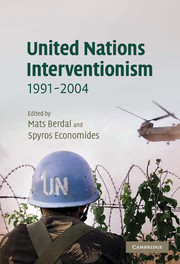3 - Former Yugoslavia
Published online by Cambridge University Press: 22 September 2009
Summary
The experience of the United Nations (UN) in former Yugoslavia up to the end of 1994 was a depressing one, especially as it followed the success of the Gulf War and the prospect of a ‘new world order’ in 1991. Regional organisations such as the European Union (EU) and NATO were also infected by the miasma of failure. In this chapter the wreckage is examined: what caused the disappointment of the high hopes of a successful intervention? Was the failure as total as some feared? What lessons can be extracted about relations between the regional and the global organisations in protecting the peace?
In the body of the chapter the main currents in the UN's drift to disaster are charted, not in terms of the incidents on the ground, but in the decisions of those who controlled the agenda. In a concluding section some lessons for the future are deduced.
The break-up of the Yugoslav Federation
Following Tito's death, the rigidities of the Cold War international system held Yugoslavia together for a while, but the demise of communism and the ensuing cataclysmic changes in Eastern Europe released the centrifugal pressures which had previously been contained. By the beginning of the 1990s, there was rising tension between the republics of Serbia and Croatia, the two dominant segments of the old state.
- Type
- Chapter
- Information
- United Nations Interventionism, 1991–2004 , pp. 65 - 107Publisher: Cambridge University PressPrint publication year: 2007
- 2
- Cited by



